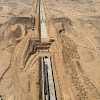IMF praises Saudi Arabia’s unprecedented
success in economic transformation
Saudi Arabia has received high
praise from the International Monetary Fund (IMF) for its remarkable progress
and sustained efforts in advancing its economic transformation, which the IMF
described as "unprecedented." The Kingdom has made significant strides
in modernization and diversification as part of its Vision 2030 initiative,
with the IMF projecting a 4.4% medium-term growth in the non-oil sector.
This recognition came during a press
conference held by Amine Mati, the IMF's Assistant Director, Mission Chief for
Saudi Arabia, and Head of the GCC Division, where highlights of the IMF’s
annual report were presented. Mati emphasized Saudi Arabia’s impressive
economic achievements under Vision 2030, particularly its success in
recalibrating investment spending and prioritizing projects through integrated
sector strategies.
Read More IMF
appreciates Vision 2030 to keep Saudi economic and fiscal position strong
The IMF report noted the Kingdom’s
fiscal adjustments, including a recent study on fiscal space that helped
optimize investment spending to avoid the risks of economic overheating. The
Executive Board of the IMF expressed support for this recalibration, viewing it
as a key to highlighting government priorities and boosting investor
confidence. Saudi Finance Minister Mohammed Al-Jadaan confirmed that the
Kingdom would adjust its Vision 2030 plan as needed to continue transforming
the economy.
The IMF forecasts that Saudi
Arabia’s debt-to-GDP ratio will rise to 36% by 2029, comfortably below the
country's threshold of 40%. Overall growth is expected to reach 4.7% in 2025,
aided by the phasing out of oil production cuts, while inflation remains under
control due to consistent domestic policies and a stable peg to the US dollar.
The report also highlighted Saudi Arabia’s record-low unemployment rate and the
exceeding of its Vision 2030 goal of 30% female labor force participation.
Read More IMF’s
Georgieva praises Saudi Vision 2030 reforms as highly successful
Despite oil production cuts leading
to a 0.8% contraction in 2023, the non-oil GDP grew by 3.8%, driven by strong
private consumption and investment. Inflation rates also dropped from 3.4% in
early 2023 to 1.6% by mid-2024, supported by a stronger exchange rate.
Additionally, the rise in rents and wholesale prices reflected increased
redevelopment activities in cities like Riyadh and Jeddah.
The IMF report also noted that the
current account surplus fell to 3.2% of GDP in 2023, primarily due to lower oil
exports and higher imports tied to investment projects. However, this was
offset by a record services balance surplus, including a 38% rise in net
tourism income. Saudi Arabia’s reserves remained robust, covering 15.8 months
of imports.
Read More Saudi
Vision 2030, a remarkable example of economic transformation: IMF Chief
The IMF commended the resilience of
Saudi Arabia’s banking sector, with stress tests revealing its capacity to
withstand severe shocks. The IMF Board further praised the Kingdom's progress
in renewable energy, its commitment to achieving net-zero emissions by 2060,
and efforts to enhance the business environment through digitalization and
improved governance.
Overall, the IMF lauded Saudi
Arabia’s ongoing economic transformation, robust non-oil growth, and stable
macroeconomic outlook, reinforcing the Kingdom’s position as a leading economic
player in the region.
Source: Saudi Gazette









0 Comments